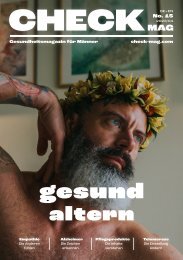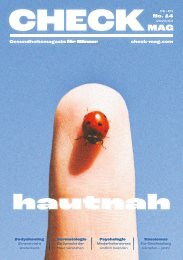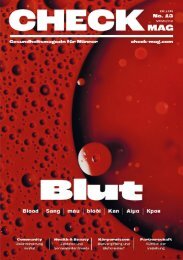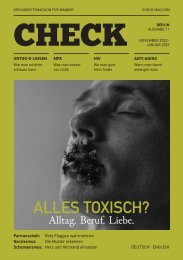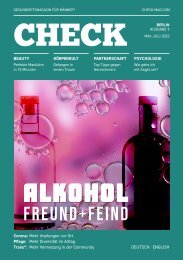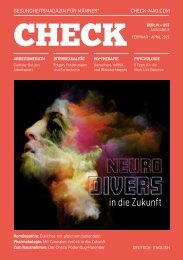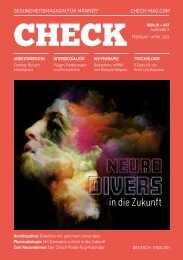CHECK Magazin - Gesundheitsmagazin für Männer No.7
Männer sterben statistisch gesehen etwa fünf Jahre früher als Frauen. Das mag auch daran liegen, dass sie sich eher scheuen, regelmäßig zum Arzt zu gehen. Schließlich sind wir ganze Kerle und beißen lieber die Zähne zusammen und gehen erst zum Onkel Doktor, wenn es richtig weh tut. Vorsorge lohnt sich aber, besonders wenn es um Krankheiten geht, die unsere Lebensqualität bei Ausbruch enorm mindern.
Männer sterben statistisch gesehen etwa fünf Jahre früher als Frauen. Das mag auch daran liegen, dass sie sich eher scheuen, regelmäßig zum Arzt zu gehen. Schließlich sind wir ganze Kerle und beißen lieber die Zähne zusammen und gehen erst zum Onkel Doktor, wenn es richtig weh tut. Vorsorge lohnt sich aber, besonders wenn es um Krankheiten geht, die unsere Lebensqualität bei Ausbruch enorm mindern.
Erfolgreiche ePaper selbst erstellen
Machen Sie aus Ihren PDF Publikationen ein blätterbares Flipbook mit unserer einzigartigen Google optimierten e-Paper Software.
ENGLISH<br />
HIV<br />
When the STIGMA is more<br />
harmful than infection<br />
The Institute for Democracy and Civil Society (IDZ) and the Deutsche Aids Hilfe (DAH)<br />
presented the research results of the study “positive voices 2.0”. The results were<br />
shockingly little better than in a partially comparable study from 2011.<br />
COMMUNITY RESEARCH<br />
For the study, almost 1,000 HIV-positive people<br />
took the time to fill out the online questionnaire<br />
about their personal experiences and<br />
consequences with discrimination. In addition,<br />
almost 500 HIV-positive people were interviewed<br />
about their story. What is special about<br />
this project is that it not only gathers knowledge<br />
about the current status of discrimination<br />
against HIV-positive people, but also that<br />
the interviewers themselves are HIV-positive.<br />
This lowers the respondents' inhibitions and at<br />
the same time increases their willingness to<br />
be completely transparent.<br />
This study is also a community project because<br />
the respondents are guided through every step<br />
of the research, ensuring participatory research.<br />
DEALING WITH POSITIVE PEOPLE<br />
LAGS BEHIND SCIENTIFIC PROGRESS<br />
Around 73% of those surveyed state that in<br />
many areas of their lives nobody knows about<br />
the disease, because the social restrictions<br />
after this coming out are far-reaching. Due to<br />
the fact that there is still too little education,<br />
there is still a social stigma towards the<br />
disease that no longer holds true. Despite the<br />
advances in medicine since the last survey<br />
in 2011, there is still only slow progress in<br />
societital discussions and openness towards<br />
the topic of HIV.<br />
According to Matthias Kuske, project<br />
coordinator of the study "positive voices<br />
2.0", it makes no sense to treat people<br />
with HIV differently from other people,<br />
or to adopt more stringent hygiene<br />
concepts, because HIV is no longer<br />
transmissible with the right therapy.<br />
STILL SEVERE DISCRIMINATION<br />
Thanks to the good therapy offered nowadays,<br />
three quarters of those surveyed stated that<br />
they had no, or only a few, health problems.<br />
Compared to the health aspect, which ostensibly<br />
should be the most important one, a<br />
full 52% of the respondents state that they<br />
are impaired by prejudice in the social area<br />
of their life. The ignorance of the effects of<br />
the disease and the ways in which the virus<br />
is transmitted not only leads to HIV-positive<br />
people being misunderstood. It leads to their<br />
discrimination and different treatment in the<br />
private sphere, with 16% of those surveyed<br />
stating that being open about their infection<br />
even led to general health services refusing<br />
treatment on the part of the doctor.<br />
CONSEQUENCES AND DEMANDS<br />
This project has brought self-confidence,<br />
strength and, above all, new contacts to the<br />
interviewees and also to the interviewers. In<br />
order to steer the discourse about HIV in a<br />
hopefully better, more unprejudiced direction,<br />
the project calls for an appropriate presentation<br />
of what life with HIV really is like and<br />
what HIV therapy does.<br />
Matthias Kuske sums it up, "Today people with<br />
HIV can live, love and work like everyone else."<br />
(Marco Bast,ck,mb)<br />
Grafik: Iuliia / stock.adobe.com<br />
70 <strong>CHECK</strong> BERLIN/BRANDENBURG #7









